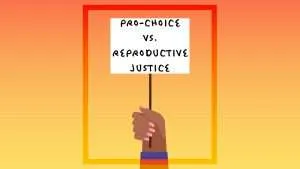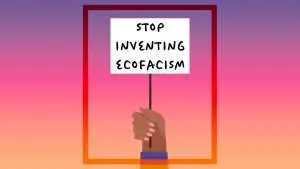Editorial Note:
This blog series offers accessible explainers on reproductive health, policy, politics, and social movements. Each post focuses on one aspect of reproductive health and provides an overview of the history, current conversations, and research on the topic.
From the author: From environmental movements to the criminal legal system to new age instagram, reproductive health and politics covers a lot of ground! It is a full time job staying up to date and I should know because it’s my full-time job! I know not everyone can spend hours a week reading up on reproductive health, so I’ll boil it down to 800 words or less so you can get and stay in the repro know.
Get in the Repro Know: Reading List
- Zakiya Luna: Reproductive Rights as Human Rights
- Leslie Reagan: When Abortion Was a Crime
- Dorothy Roberts: Killing the Black Body, Shattered Bonds, Torn Apart, Fatal Inventions
- Suzanne Staggenborg: The Pro-Choice Movement
- Patricia Zavella: The Movement for Reproductive Justice
- Collective works of Loretta Ross
- Collective works of Wagatwe Wanjuki
- Siri Suh: Dying to Count: Abortion Care and Global Reproductive Health Politics in Senegal
- Krystale E. Littlejohn: Just Get on the Pill
- Katrina Kimport: No Real Choice
- Laura Briggs: How All Politics Became Reproductive Politics: From Welfare Reform to Foreclosures to Trump
- Advancing New Standards in Reproductive Health
- Guttmacher Institute: research on reproductive health policy
How to Get Involved and How NOT to Get Involved
The swell of public support for abortion access following the Dobbs leak demonstrated just how popular abortion rights actually are and that people were willing to fight for it. The recent midterms underscore this support—all five states with abortion measures voted to protect abortion access. Voting is only one way people are showing their support. This post highlights some of the ways people responded to Doobs and how you can participate in the fight for abortion rights effectively. I also include some cautions on activism that may get you into legal trouble. Please note that I am not a lawyer and I am not intending this as legal advice. I recommend checking resources like the ACLU and the Center for Reproductive Rights for more on abortion, protesting, and the law.
Stop Inviting Strangers Camping
When the Dobbs decision leaked many well meaning folks took to social media to post their willingness to assist pregnant people seeking abortion. The euphemism “go camping” spread widely. The euphemism was not particularly subtle. It posed a scenario in which camping was outlawed in some states and not others and that people in pro-camping states might offer to take people in non-camping states on camping trips. Even a casual observer would be able to understand camping stood in for abortion. The people offering to facilitate “camping” are overwhelmingly not actively working for or with established organizations. This makes them and the people they hope to assist vulnerable to legal, physical, and medical risks.
While these campers and would-be “aunties” mean well, very few have the logistical knowledge of how to get pregnant people connected to the resources they need. Abortion providers are often part of dense activist networks. These networks help with funding, traveling, legal issues, and community support. The knowledge and expertise of these networks cannot be understated. Individuals hoping to get involved in abortion activism should be connecting with existing resources. Well-meaning but ill-prepared “helpers” can be preyed on by anti-abortion activists, incur legal penalties, and prevent a person seeking an abortion from connecting with established providers. The legal situation around abortion, providers, and facilitators is in flux. Digital privacy is going to be paramount as states increasingly target people seeking abortions. People feel strongly about Roe and want to demonstrate their commitment to abortion activism, but posting publicly about violating laws or offering to facility abortion only puts you (and anyone who seeks help from you) in the crosshairs.
Don’t Start From Scratch
Abortion activism predates Roe and is ongoing. You do not need to start from scratch. It is tempting to romanticize activism and the legal (and physical) risks it can require. The bulk of sustained, successful action comes from organizing and community. People imagine heroic acts and outstanding, individual leaders as the creators of social change but more often than not activism is attending meetings, completing tedious but necessary tasks, and listening to those with more experience and knowledge within the movement. If you are truly interested in abortion activism I recommend volunteering at clinics or with abortion funds. Learn the local landscape of providers, services, and organizations. Protests and activism are not discrete events. They are part of ongoing struggles and require sustained commitments. These commitments are usually less glamorous than taking a stranger camping, but they will have a far greater impact.
Concrete Steps to Take to Support Abortion Access
- Read. Read up on the history of the reproductive justice movement in the US. You can start with our reading list (see above). Understanding the historical context and inequalities within and surrounding movements for reproductive health is pivotal for effective collective action *(changing the world involves a lot of reading and meetings)*
- Identify the organizations local to you (including bad faith organizations) – abortion funds, clinics that provide abortions, crisis pregnancy centers (also known as “fake clinics”)
- Learning the abortion landscape in your area and working with local activists will help you connect with volunteer opportunities
- If you don’t know where to start try identifying larger orgs like SisterSong, NARAL, or Planned Parenthood. They may list rallies, informational meetings, online sign ups with progressive orgs, etc. Larger organizations can be a gateway to local connections – who do these orgs partner with in your community? What local orgs, providers, or politicians work with them?
- Volunteer with organizations that have a good reputation locally (Planned Parenthood and national organizations are typically better funded and staffed so look into smaller orgs)
- Smaller, local networks are a great way to make a difference in your community
- Consider joining the org through committees, boards, or general membership – stay active even when abortion is not in the news cycle
- Learn about digital literacy and privacy practices
- How can you keep your devices and communications protected? Using codes and emojis is not enough to protect you in court – learn ways to have secure/encrypted conversations before you need those skills
- Support efforts to include digital communications under the 4th Amendment
- Follow current cases – how are law enforcement collecting digital information? They are not analyzing all user data from period tracking apps. It is much more likely that a friend, family member, or partner will turn in incriminating information
- Learn about laws surrounding abortion and protest in your area and nationally
- Knowing your rights may not prevent you from legal troubles, but understanding the legal developments surrounding abortion can help you avoid additional complications
- Protest policing does not always follow the letter of the law – be prepared for a variety of scenarios and outcomes related to protesting – just because you do not engage in actions that warrant use of force does not mean you will not experience use of force or legal threats – know what to do and where to go if a protest becomes unsafe






